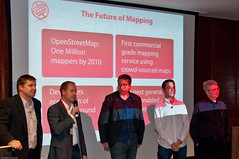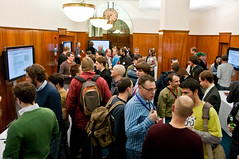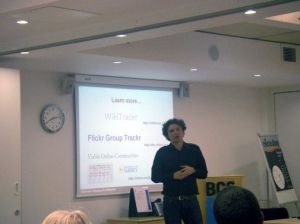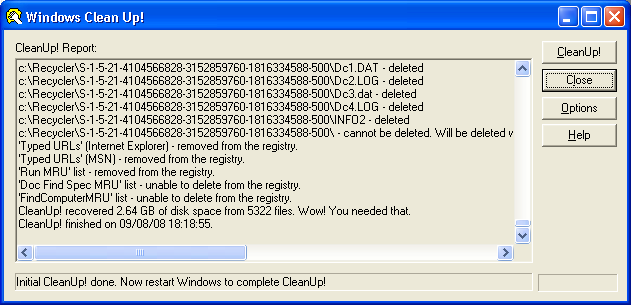Last week the London Wiki Wednesdays thing kicked off again, which I’m pleased about. I enjoyed this regular meet-up of wiki and web 2.0 enthusiasts. It was happening monthly for a while, but this is the first time we’ve managed to get together in 2008. Apparently David Terrar has been struggling to find people to host it, so if anyone knows anyone who has a big (~40 capacity) room with a projector, we’d love to use it (in exchange for appreciative blog links). Big thanks to David Terrar for managing to bring it together again, and special thanks this time since he paid for the food & drinks himself! I showed my appreciation by drinking all the booze and rambling to him on the tube on the way home! And thanks to Alek for hosting us again.
 Andreas Rindler’s OmCollab looked interesting. It’s a blending of MediaWiki with WordPress and bookmarking tools. Some nice customisations, obviously including skinning, but also dropping in various extensions for added toolbar buttons, category tag clouds, easy attachments etc.
Andreas Rindler’s OmCollab looked interesting. It’s a blending of MediaWiki with WordPress and bookmarking tools. Some nice customisations, obviously including skinning, but also dropping in various extensions for added toolbar buttons, category tag clouds, easy attachments etc.
 Andy Roberts pointed out that wordpress is adding a ‘revisions’ feature, which is rather wiki-like. This kicked off a discussion about using wordpress as a wiki , whether it can be regarded as a wiki, and whether you want to use it that way. Without actually playing with it, it’s not clear whether it would support open editing, how it would relate with the “publish” button, or what would appear in RSS feeds. Personally I don’t expect wordpress to become a wiki. It is fundamentally a blogging tool, and this little revision feature does not represent a dramatic departure from that. But it is nod towards the wiki way of thinking, and this is exciting because wordpress is so extremely widespread, with a colossal installed-based. That’s a lot of users who may start to feel more comfortable when they see a history page in a wiki interface.
Andy Roberts pointed out that wordpress is adding a ‘revisions’ feature, which is rather wiki-like. This kicked off a discussion about using wordpress as a wiki , whether it can be regarded as a wiki, and whether you want to use it that way. Without actually playing with it, it’s not clear whether it would support open editing, how it would relate with the “publish” button, or what would appear in RSS feeds. Personally I don’t expect wordpress to become a wiki. It is fundamentally a blogging tool, and this little revision feature does not represent a dramatic departure from that. But it is nod towards the wiki way of thinking, and this is exciting because wordpress is so extremely widespread, with a colossal installed-based. That’s a lot of users who may start to feel more comfortable when they see a history page in a wiki interface.
People pointed out that this wordpress-wiki wouldn’t support wiki style links, that is, links which are (perhaps) created via some [[square brackets]] or CamelCAse, to create a new page by the same title, or to point to a potential new page. In my opinion this a defining feature of the wiki concept. It is the linking approach which allows wikis to function as a gloriously simple but powerful knowledge management tool, and can also lead to a characteristic wiki sprawling mess in the absence of careful wiki-gardening. Conventional HTML linking features won’t cut it, in my opinion. On the face of it, the only thing which matters about a wiki, is that you can edit a page really easily. But for me the wiki linking aspect cannot be dismissed.






 Andreas Rindler’s
Andreas Rindler’s